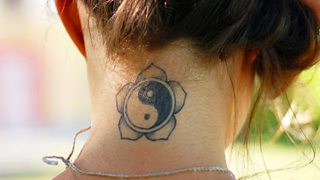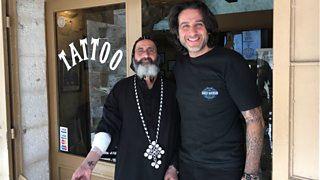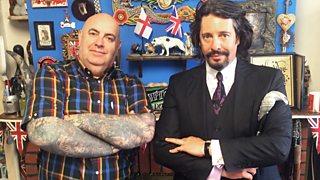Everything you need to know about tattoos
Getting a tattoo is more and more popular and there's been a big rise in the number of people setting up shop to offer them.
They're not all good though and they're not all obeying the hygiene rules.
, which is a health education charity, has been looking into that. It surveyed around 900 people who had a tattoo in the last five years. One-in-five experienced trouble - lumps and swelling. A much smaller proportion – one-in-fifty – developed a skin infection.
With their help, the Βι¶ΉΤΌΕΔ's Smart Consumer podcast has come up with these tips for getting a tattoo safely.

-
![]()
Everything you need to know about tattoos
The Smart Consumer podcast with tattoo artist Lee Clements and YouTuber Lucie Parfitt.
Do your research
The regulations for setting up tattoo parlours are different around the UK. You have to register and you should be monitored by local council officials, but the extent that artists are checked can vary.
You should check whether the tattoo artist is registered and it's worth looking at online reviews, too. You should never go somewhere you haven't researched properly.
Caitlyn Donaldson, the policy lead at , said "Always check first whether the tattooist is registered or licensed with your local council. This can be difficult because licensing is different depending on where in the country you live. But in the end, most tattooists work safely and to a high standard, and they should be recognised for their work."
It's worth looking at online reviews and any artist's social media accounts, too.
Why getting a tattoo could be giving you the needle healthwise

Lucie Parfitt on experiencing an infected tattoo, and how to implement hygiene rules.
Booking is good
Good tattoo artists are usually booked up well in advance. Lee Clements from the said if you can just walk in off the street and have one done, that should raise alarm bells.
Hygiene is key
Infections from tattoos are rare. But when they do occur, they can be serious.
Tattoo artists should make sure all needles and clean and sterilised and that they clean up after each procedure.
You should make sure all equipment, walls and floor surfaces clean and made of materials which can be easily cleaned. There should be a hand wash basin in the treatment room or nearby.
How have our perceptions of tattoos changed?

Iszi Lawrence and Tom Holland trace the origins of today's tattoos and body art.
Some parts of the equipment should be wrapped and a new needle should be used.
If you can just walk in off the street and get a tattoo done, that should raise alarm bells. Good artists are usually booked up well in advance.Lee Clements from the British Tattoo Artists Federation
Lee Clements from the said the cleaner the place looks the better. “If you feel like you're in a dentist then it’s probably a good place to get a tattoo,” he said.

It's a professional operation
Tattoo parlours are a good option, but some people do operate from their homes. If that's the case you should be careful to check they're registered, and look at their reviews too. People can buy tattoo equipment and ink online for as little at £40. It might be worth asking the artist where their equipment came from.
Caitlyn Donaldson, policy lead at RSPH, said: “There are several things you can look out for to check if your tattooist is working safely. If it is not obvious that they are using cleaning materials and sterilising equipment, this should ring alarm bells. Also think about where you are getting your tattoo. In the past, infection outbreaks have been associated with tattooists working in unprofessional settings, like a bedroom in a terraced house."
Think about aftercare
The procedures involve piercing the skin and, without good care by the technician and customer, bacteria and other organisms can get into the body, risking infection. The tattooist should cover your tattoo with a dressing when they have finished and supply you with detailed verbal and written aftercare advice, for example using an anti-bacterial soap to prevent infection.
Is this the world's oldest tattoo parlour?

In a back alley of Jerusalem, pilgrims can find what's believed to be the world's oldest tattoo parlour.
What should the tattooist do?
If you feel like you're in a dentist then it’s probably a good place to get a tattoo.Lee Clements from the British Tattoo Artists Federation
According to there are certain measures a good tattooist will take. These include asking for proof of age when appropriate, discussing what tattoo you would like and advise accordingly, and carry out a detailed client assessment including asking questions to establish your medical history.
Changes are coming
A new licensing scheme is being introduced in Wales next year. It will include a new national register, a health and hygiene exam and tattoo artists will have to show they have studio experience. So if you live in Wales, you should be able to check if the tattoo artist you're looking at has completed that.
The RSPH said having Wales' licensing system, where tattooists will need to have an infection control qualification, as a standard for the rest of the UK would be welcomed. The hopes if it's a success it could be introduced UK wide.
Why religious tattoos are all the rage

Trevor Barnes delves into the fascinating and sometimes controversial world of religious tattooing.
More from Radio 4
-
![]()
Everything you need to know about tattoos
The Smart Consumer podcast with tattoo artist Lee Clements and YouTuber Lucie Parfitt.
-
![]()
The Intimate Art of Tattoo
Laurence Llewelyn Bowen considers the exponential rise in tattoos across the UK.
-
![]()
A Mortal Work of Art
Mary Anne Hobbs explores the meeting point between the world of fine art and the world of tattoos.
-
![]()
Tattoos
A selection of programmes and clips relating to tattoos and body modification




